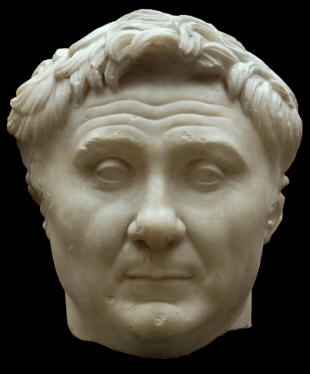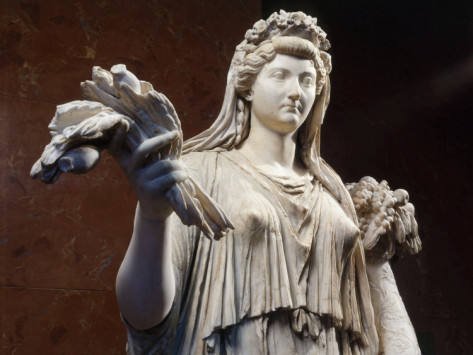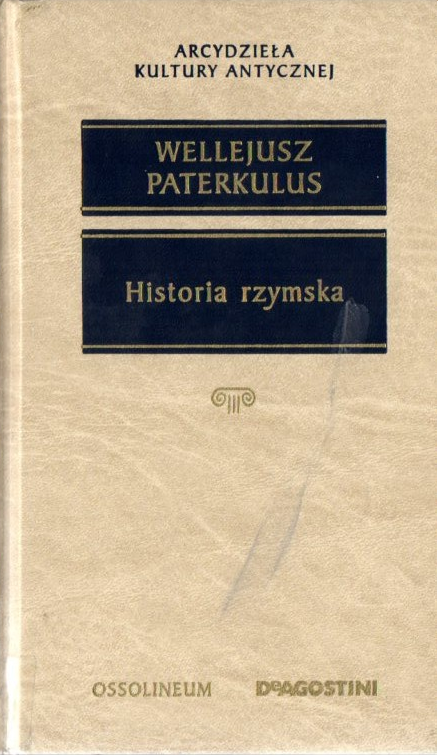Marcus Velleius Paterculus – a Roman historian which, for some reason, Google thinks is Pompey Magnus. Why I tell you so you may ask? You see, a sculpture of Pompey Magnus is mistakenly used as an image of Marcus Velleius Paterculus. But enough with that digression. I only mentioned it, because I always try to imagine myself a face of an author. As you see, it didn’t work for me this time. Google bested me.

We actually know a lot about Marcus Velleius Paterculus, but I will just stick to the most important facts, that are of the most value for the sake of this review and to those information that I found plain interesting. I will fancy myself few digressions from time to time.
Our fellow Paterculus is an army man. He fought all across empire starting his carrier in not friendly soils of Macedonia. At that time it was a place where every young tribune, legatus, or simple soldier could find a lot of money and experience and more often, a quick, brutal death. A dangerous place, defended by brave Thracian warriors. Later on, in the history of Rome, when Macedonia was conquered by Romans, their strategy and equipment was adapted for the use of gladiators. Thracians were also considered to be the best slave for this purpose. Spartacus anyone? Although Paterculus was born long after Spartacus’s revolt, we can only imagine how roman soldiers might have felt in Macedonia. Surrounded by hundreds if not thousands Spartacus alike soldiers. Paterculus is also known to be present at the interview on the king Euphrates between Emperor Augustus and the Parthian king Phraataces. It always strikes me when I hear about legionaries stationed in this, so called, paradise on the world. Of course, only those soldiers who didn’t travel that far, thought so. Maybe the same could be told about Paterculus. He might have expected cheap delicious wines in taverns, towns filled with beautiful women looking for strong and well-endowed roman citizens. Instead he most certainly stumbled across, thousands of mosquitoes, merciless sun, and burned his nutsack on a horse. That’s doubtless, as it happens to soldiers to this very day. To his utter dismay, Paterculus yet again traveled to another destination. It was Germany this time. Not a bad choice, nor a good one. Well, actually it is not like he had any choice in the first place. He was promoted first to praefect of calavry and later to legatus, which was actually the highest possible promotion available at that time for such a simple person. Since most of his works, are somehow related to Marcus Vinicius, (try to remember that name, it will be mentioned in this review, and in Paterculus’ book), we must assume he met him there. As Marcus Vinicius brought many victories for the proud empire, Paterculus had to be near him as a legatus. They probably forged a friendship, and became very close to each other, even after war in Germany. During the lecture of his Compendium of Roman History, one may even think that Paterculus dedicated his work to his friend in arms. That’s how many times Vinicius’ name is mentioned.

So, with all that said, let me get straight to the summary, and please pardon me, if I didn’t do that fast enough in your opinion. I just think that there is not much to talk specifically about the book. It just your run-of-the-mill history of Rome, which I am sure you are well aware of. The title, “Compendium of Roman History” is precise as hell. This book has a whooping amount of 200 pages for a history of roughly 700 years Empire, and even more if you consider first part with Greeks. Paterculus tends to use rather casual style of writing. That is, to a reasonable extend, and later in his work. Because the beginning is full of rather long, and not really passionate history of Greeks and their colonies in Italy and Europe. As Paterculus wishes to be precise, he does not only mentions those cities, which were important for the creation of Rome as it is, but also less known and not influential whatsoever. Don’t get me wrong, from a historian point of view those details are of tremendous value. However it is quite different than the Suetonius’ works, where tons of so called “fun facts” are introduced. However, once Paterculus enters the beginning of principate, all of the historical scenes become more real. My guess is that Paterculus had to, obviously, rely on past historians works to complete his own, but once he could write basing on his own knowledge, and experience, bull’s-eye. Paterculus wasn’t a republican, that’s for sure. Since he was born in c. 19 BC and died c. AD 31, it is clear, that even if he wanted to, he couldn’t really manifest his ideas anyway. Keep in mind, that at the same time Ovid has written “Ars Amatoria” also known as “Art of Love”, a nice little harmless piece of work which costed him freedom, and angered emperor Octavian and Livia alike. Paterculus had to step carefully then, as did every writer in that time, except poor Ovid of course. So we do not know for sure, whether that strong army man was a republican or really pro-emperor. Well we kind of do. He bombards the reader with numerous acts of worship for the Imperator, trying to convince everyone that he is doing the right thing, or maybe he just tries to convince himself. After all, Paterculus died in 31 AD killed by Sejanus whom he adored so much. Treason, or love to death? Only now we have such comfort to express our view without any fear of praetorian gladius being struck right in our back.

Now, let me mention Marcus Vinicius again, as I probably won’t get another chance in future reviews. I had first heard about this persona back in elementary school, where I had pleasure or displeasure (take your pick) of watching a Polish adaptation of Henry Sienkiewicz “Quo Vadis”. Few notes here, at that time I wasn’t really into ancient Rome. Dumb as I were back then (hope that changed) I still managed to get bored by flat characters (with few exepctions) and predictable plot. However, the name of Marcus Vinicius crept into my mind, and stayed there until I rediscovered him again. As it was mentioned before, he was a great general who has won major campaign against Germans under the command of Germanicus. The emperor Claudius gave him the rights to triumph after the conquest of Britain, something extremely unusual back then. Note, that prefect Aulus Plaucius earned only an ovation, yet he has done much more than Vinicius. However, in the movie, and in the book for that matter, he was indeed portrayed as a general with rights to triumph, but during the Nero’s reign, when in reality Vinicius was already dead due to our beloved vicious Messalina. In the movie he fell in love with Christian Ligia, but that’s not important, since it didn’t happen historically. Apparently, Vinicius was involved in Caligula assassination, and he even had aspirations to become an emperor. Now, that’s a dangerous friend for you. This digression had one purpose, to learn your history right. I made it especially for those who had watched either Polish version of “Quo Vadis” from 2002 or English version (hundreds times better) from 1951. Tough majestatic, they do not depict history as it is. I felt I owned that dude justice. After watching the older movie of course.

Paterculus managed to convey, a rather coherent story of roman history, and also a trustworthy one. He mentions works he used for his own, and even gives a nice little comments on what he thinks about them. Even Casiuss Dio used his Compendium, so it can’t be that bad, right? As usual , numbers of enemy troops killed, are wrong unfortunately. Paterculus didn’t even bother to count the exact number and he often just writes whatever is convenient to him, with a lot of zeros that is. But hey, if you knew that your book would survive over 2000 years, and future generations decided to create the look of your empire based on your work, why try?

